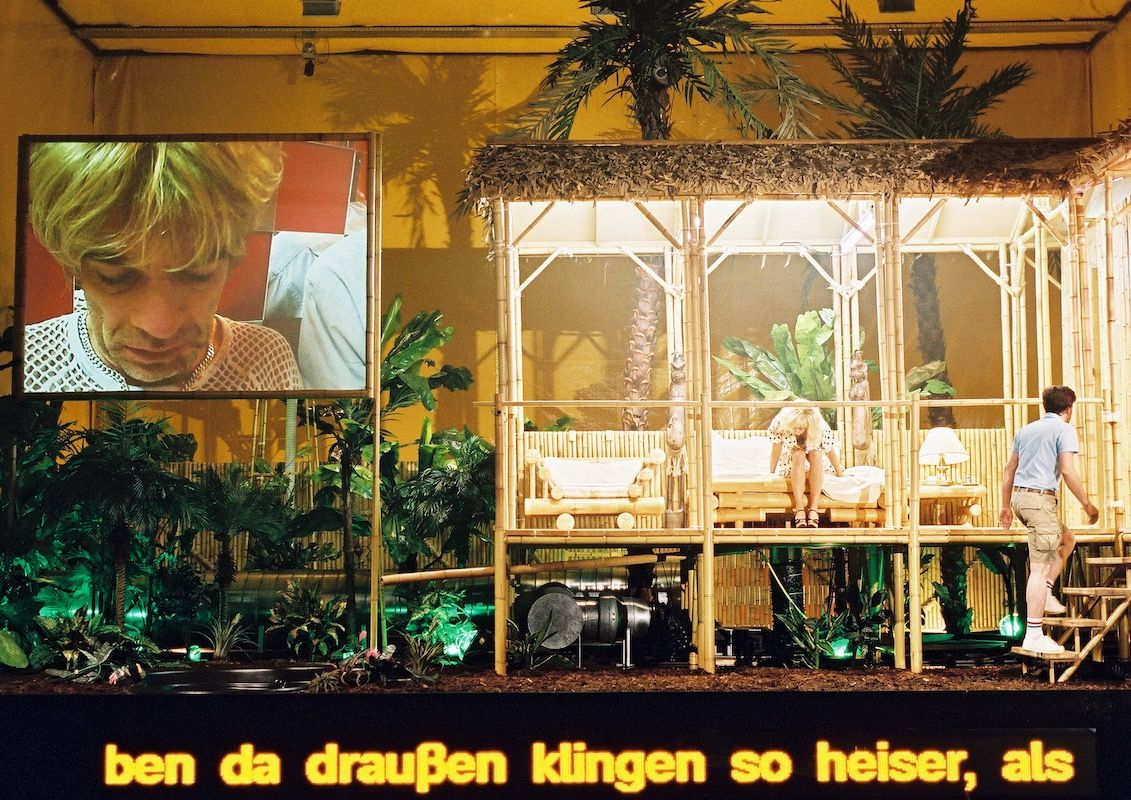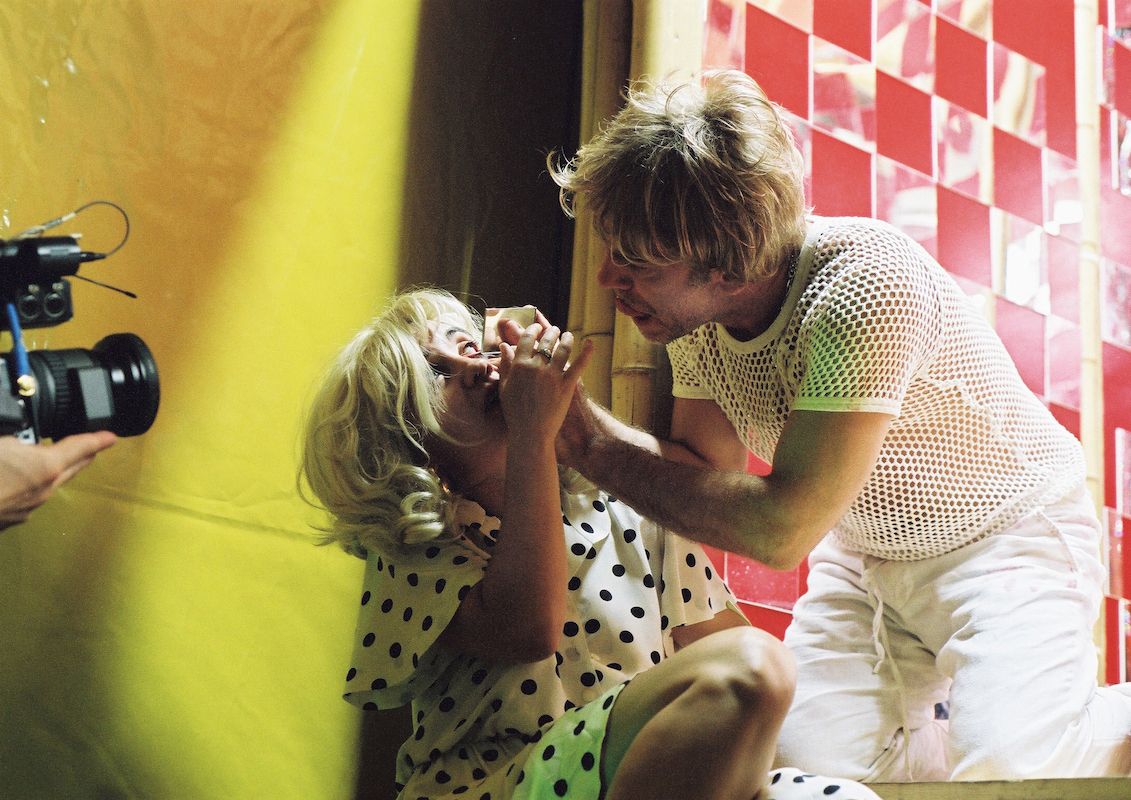It doesn't happen often that I go and see the same play twice. In Frank Castorf's stage productions there is usually so much going on that going to see it twice is almost required to take it all in. It may sound odd, but one of the things I like about his productions is that they are very colourful, a real visual treat. In Forever Young, Castorf's adaptation of Tennessee Williams' Sweet Bird of Youth, the dominant colours are yellow and green.
Set against a background of corruption, hypocrisy and racial tension, Tennessee Williams' Sweet Bird of Youth is a tale of disillusion and loss. Alexandra Del Lago, an aging actress, who has taken on the name Princess Kosmonopolis, finds herself in a hotel room in Florida. Horrified by her own appearance, she has fled Hollywood after seeing the premiere of her latest movie, taking refuge in alcohol, sex and drugs.
For sex she has hired Chance Wayne, a playboy who dreams of becoming a movie star and who has just returned to his hometown to look for his mother and the love of his youth, Heavenly Finley. When they were both young their relationship had been frustrated by Heavenly's father, Boss Finley, a politician, who rules the town and his family like a tyrant. Chance moved to New York in pursuit of his dreams, but ended up as a gigolo.
On one of his visits home he became once again involved with Heavenly Finley, during which he, allegedly, infected her with syphilis. The illness turned sour and she required an operation, leaving her unable to have children. When he hears of Chance's arrival, Boss Finley wants him out of town before midnight. If not he will have him castrated.
The play ends with Princess Kosmonopolis returning to Hollywood after learning that her movie turned out to be a hit. She begs Chance to come with her, but he refuses, accepting the fate that awaits him by staying in town. In the final scene he steps forward to directly address the audience, asking not for compassion but understanding, or not even that, only that they recognize themselves in him, and the enemy in each and everyone of us, Time.


In Forever Young, Frank Castorf's adaptation of Sweet Bird of Youth, the drama is no longer carried by the plot, but by the characters, each of whom constitutes a micro drama ready to explode. Princess Kosmonopolis and Chance Wayne, whose outbursts of despair and rage go straight through the heart. George Scudder, the doctor who performed the operation on Heavenly Finley and now intends to marry her, who constantly laments about his depression, which has left him wrecked. Heavenly who refuses to accept that she can no longer have children. Even Boss Finley becomes a pitiful character when he cracks up during a tropical rainstorm. Screaming, shouting and whining the characters constantly try to convince each other of their own misery. When the other doesn't listen they turn to alcohol, drugs or watching pornographic manga movies on television.
Castorf has transposed the setting to a holiday resort on a tropical island, a place where the outside world with all its problems doesn't enter, but inner problems fester all the more. We see a bungalow on stilts surrounded by fake palm trees. Inside the bungalow we see a bedroom with a double bed and a kitchen with a bar. Some elements of the set design only become apparent well into the performance. To the left of the house is a pool, in which the characters bath, tumble and try to drown themselves.
In one memorable scene George Scudder complains to his fiancée Heavenly Finley that his Armani trousers got wet. Asking her to read aloud what it says on the label he pulls out his trousers, smashes them into the water and then throws them into the audience. "Trocken reinigen! Dry Cleaning! And now they are wet, wet, wet!!!"
As in all of Castorf's recent productions, the piece makes ample use of live video, projected on a large screen to the left of the holiday home. It is thus that we learn that there is a bathroom behind the kitchen and a beach behind the rear bamboo wall. The cameras allow Castorf to get on top of his actors, as in one magnificent scene in which Chance Wayne played by the formidable Martin Wuttke removes a hair from Princess Kosmonopolis' eye, played by the equally astonishing Kathrin Angerer. The camera zooms in on her eye as he pulls down her eyelid and scratches it with the edge of a make-up mirror. No realism but reality, as Castorf likes to say.
Forever Young is as much a piece about the tension between reality and ambition, the cult of youth and the dark side of consumerism, as it is a reflection on theatre, its workings and its relevance in a world dominated by television. Every once in a while an actor steps outside the setting to directly address the audience or to read a text from an illuminated news trailer built into the raised stage floor. In a staged moment of narcissism, the actors frequently interrupt a scene to glance into the camera, knowing that it is not the camera that sees them, but the audience. I may be drunk, spoiled or a tyrant, cursing and foaming with rage, but hey, I'm a nice person.
Throughout the performance the actors are referred to both as the characters they play, - Chance Wayne -, and as themselves, - Martin or Wuttke. In one scene, set in the bathroom behind the kitchen, Heavenly Finley stands on Chance Wayne's back, her head put through a rope. Chance threatens Princess Kosmonopolis that he will step aside, if she doesn't take him with her to Hollywood and that it will then be her fault. She doesn't give in and as Chance moves away we see Heavenly's legs hanging in the air. In the next scene Chance and Princess Kosmonopolis are in the kitchen eating oysters and drinking champagne. We hear Heavenly Finley, played by Laura Tonke, calling for Martin from the bathroom that he still has to untie her, while the camera films her hanging in the safety suit.
At about one third into the performance the plastic yellow curtain comes down and almost instantly goes up again as three new characters walk onto stage. It is at this point that I would have liked an intermission. At 2 hours and 45 minutes the piece is long. The stage design and the acting are quite overwhelming and the piece would have benefited from a short break to digest all information. Then again, in life we only rarely have the opportunity for an intermission, least of all when we most want it.
Links
My review of Der Meister und Margarita by Frank Castorf.
My review of Endstation Amerika by Frank Castorf.
My review of Erniedrigte und Beleidigte by Frank Castorf.